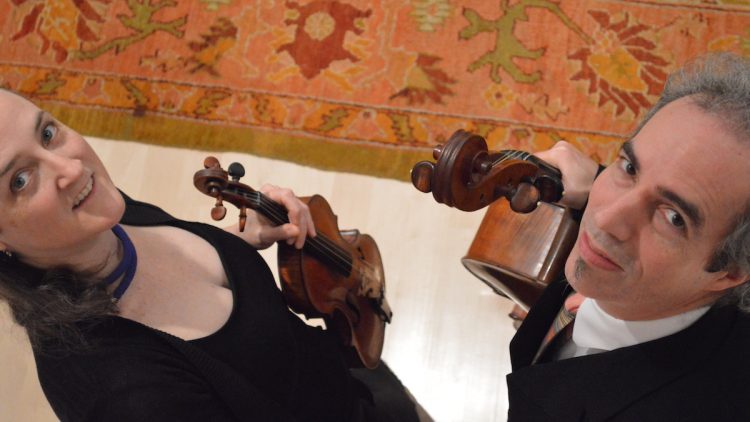
Early Music America is pleased to announce Risa Browder and John Moran as the recipients of the 2018 Thomas Binkley Award for outstanding achievement in performance and scholarship by the director of a university or college early music ensemble. This award is named for the legendary lutenist and educator Thomas Binkley, who taught at the Schola Cantorum Basiliensis, made ground-breaking recordings with the Studio der Frühen Musik, and served as founding director of the Early Music Institute at Indiana University.
We were truly surprised and deeply touched to learn that we were receiving Early Music America’s Thomas Binkley Award. We owe it all to our students in the Baltimore Baroque Band who inspire us every week with their enthusiastic dedication and to our very supportive colleagues at Peabody.
While we never got to meet him, we became aware of Binkley’s importance while studying in Basel, where he was still fondly remembered a decade after his return to America. We are thankful for the recognition and humbled by the honor of joining this illustrious roster of collegium directors who have done so much to advance the cause of early music.
EMA’s Annual Awards ceremony will be held during our Annual Meeting, Thursday, May 24, 2018, at Indiana University’s Jacobs School of Music, Bloomington, Indiana.
Biographical Information
Even in high school, Risa Browder was curious about gut strings and put a gut E string on her violin to see how it might affect her playing of Bach, much to the chagrin of her teacher at the time. However, once she was at Oberlin Conservatory studying modern violin and then baroque violin with Marilyn McDonald, she was able to delve more seriously into period performance. After graduating from Oberlin in 1985, she continued her studies at the Royal College of Music in London with Catherine Mackintosh, and then at the School Cantorum in Basel, Switzerland with Jaap Schroeder.
After nearly a decade of playing and recording with period-instrument groups in London and Europe, such as the Academy of Ancient Music, English Concert, and the Purcell Quartet, she returned with her young family to the United States, and settled into the Washington, DC area, where she and her husband, cellist John Moran, were at the forefront of the area’s burgeoning Historical Performance scene. Beyond devising and performing varied programs with her own group Modern Musick, she has been a key player on violin, viola, and viola d’amore with many other ensembles, including Folger Consort, Washington Bach Consort, the National Cathedral Baroque Orchestra, and REBEL. Reviewing a Folger Consort concert of early Italian music, the Washington Post called her violin playing “flavorful and expressive.
Risa has taught Baroque violin and viola at the Peabody Conservatory since 2004; the following year she and John Moran founded the Baltimore Baroque Band, Peabody’s period-instrument, conductor-less orchestra. Hailed as “technically polished, rich in color and refined nuances” by Tim Smith in the Baltimore Sun, BBB provides valuable learning experiences in HIP music making and has played a critical role in introducing many of these students, Historical Performance majors and non-majors alike, into the professional world of early music.
Always eager to explore new avenues and take on challenges, Risa has become passionate about playing viols, especially consort music, and encouraging others to do so. In 2006, when her son’s orchestra teacher asked her to apply for his job, which he was leaving to pursue graduate studies, she surprised even herself by taking on a new role of teaching middle school and high school orchestra at H-B Woodlawn Secondary Program in Arlington, Virginia, where she brings her quirky, early music approach to an even younger cohort of student musicians.
John Moran enjoys a broad-ranging musical career. As a determined seven-year-old, he convinced a very kind music teacher at his school to let him learn the cello, though he was officially too young for the program. Once he realized how much he liked the instrument, he abandoned his secret plan of switching to the double bass and joining an old time band.
He holds performance degrees from Oberlin and the Schola Cantorum in Basel as well as a Ph.D. in musicology from King’s College London. His own formative teachers have included Brigitte Czernik-Gruenther, Robert Ashby, Richard Kapuscinski, Catharina Meints, and Hannelore Mueller. He teaches viol, baroque cello, and musicology at Peabody Conservatory, where he and Risa Browder are founding co-directors of the school’s critically acclaimed Baltimore Baroque Band. He loves introducing students to and training them in, historical approaches that present thoughtful ways of engaging through music, such as viol consort music as a form of social discourse and the decentralized, shared musical direction of an orchestra.
As a core member of REBEL he tours extensively and can be frequently heard on the radio. He is artistic director of Modern Musick, in residence at Georgetown University. He is a longtime principal player with the Washington Bach Consort and co-creator of that group’s Wunderkind Projekt, an outreach program that introduces DC Public School students to Bach cantatas. He has performed and recorded with many of Europe and North America’s leading period-instrument ensembles. The Washington Post has called his Bach “eloquent”, and praised the “bravado” of his Boccherini and the “nimble fluency” of his Vivaldi, while the LA Times has written, “Cellist Moran projected vigorous and expressive bass lines.” He is a contributor to the revised New Grove Dictionary of Music (2001), is writing a historical monograph on the cello for Yale University Press, and is currently president of the Kindler Cello Society of Washington, DC and vice president of the Viola da Gamba Society of America. He is married to the violinist Risa Browder.

